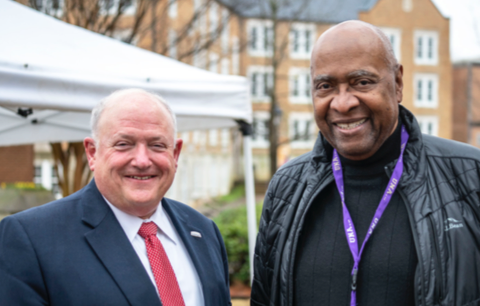UNA celebrates Black History Month
February 27, 2020
Black History Month is a yearly celebration held in February to honor and celebrate the strides, achievements and advancements made by African-Americans.
This recognition of African-Americans was initially a week-long celebration instituted by Carter G. Woodson, a black scholar and historian, in 1926. It was not until 1976 that President Gerald Ford officially recognized it as “Black History Month.”
The University of North Alabama holds several events to engage students in celebrating, honoring and learning about Black History. Last month, the university welcomed Kiese Laymon, an award-winning author, on Jan. 30, as part of its Black History Month Speaker Series. It also unveiled a historical marker recognizing the significant impact that of African-Americans throughout UNA’s history on Feb. 24.
In addition, UNA also has organizations dedicated to discussing and honoring the African American community, such as The Office of Diversity and Institutional Equity (ODIE), Mitchell-West Center for Social Inclusion and Black Student Alliance (BSA).
While the other organizations aim toward achieving institutional equality for students through diversity and inclusion, BSA is one of the only organizations on campus that is specifically tailored for African American students.
“The Black Student Alliance stands as a safe haven for the black community on campus, and a place for black students to all come together and cultivate,” said Keonte’ Sealey, a senior and BSA president. “[It] brings a voice to the black students on campus, and also serves as a way for us black students to create awareness and speak about our issues.”
BSA holds meetings every Wednesday in the Commons and is open for everyone to attend. The organization is limited to African American students, but welcomes all who want to learn more about the African American community.
On top of their weekly meetings, BSA celebrated Black History Month with their 4th annual Black History Gala on Feb. 26 in the Mane Room. The event started at 7 p.m. with live entertainment and free food, allowing students to “shine light on the rich history of African Americans and to celebrate the future they embody,” according to the event’s promotion materials.
“The Black History Gala is important because it is a gathering to celebrate black history and the future as well,” Sealey said. “We need these times and spaces to celebrate our culture. Every day that we live, we add to the black experience and we should be looked at, analyzed and celebrated.”
Sealey said students should have come to the Gala not just to celebrate the issues, but to be among their fellow peers, have a good time and to look at black history.
UNA itself made history in1963, when Wendell Gunn, now a member of the UNA Board of Trustees, became the first African American student to enroll and graduate from the university. Gunn spent one year at UNA before the passage of the Civil Rights Act of 1964 and continues to receive recognition for the role he played in the university’s inclusion.
Outside of the university, the Shoals area is known for its prominent African American figures, such as W.C. Handy, the “Father of Blues,” as well as famous musicians like Etta James and Percy Sledge, who recorded with Rick Hall at FAME Studios.
“Black History Month is a reminder to the world how successful African American people are, despite the hardships that we face,” said Destinee Lewis, a UNA sophomore. “It shows the black excellence throughout history and the present day.”
Other students see Black History Month as a way to acknowledge and support their friendships.
“Honestly, it does not mean as much to me as it means to my friends, who are black,” said Luanne Radcliffe, a freshman at UNA. “[Still,] it is important to me because it is important to my friends. It is cool to see my friends get so amped up and happy that they and their ancestors are getting the recognition that they deserve; however, I do believe that African Americans should get more recognition than they are getting.”
Sealey had his own definition of what Black History Month means to him.
““[It’s] more than a month, as we live through Black History every day,” Sealey said. “I live through Black History everyday just by living.”



![Caleb Crumpton [COURTESY OF UNA SGA]](https://theflorala.com/wp-content/uploads/2024/07/caleb-crumpton-courtesy-of-SGA-425x600.jpg)






